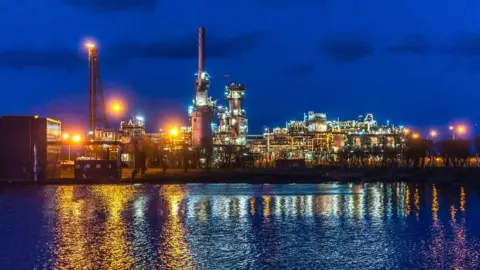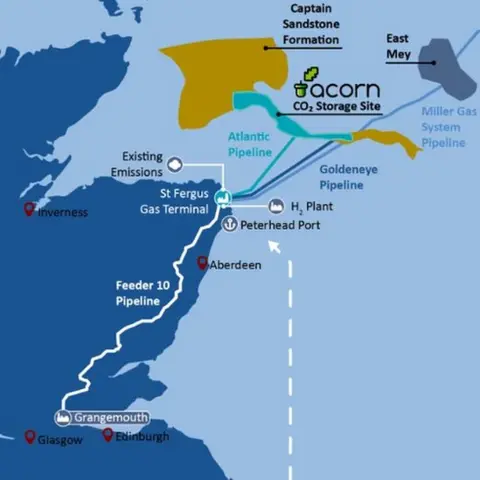UK's first carbon capture and storage project 'operational by mid 2020s'
 North Sea Midstream Partners
North Sea Midstream PartnersThe UK's first carbon capture and storage project should be operational by the mid-2020s, according to ministers.
A commitment to develop the technology, which stops greenhouse gases entering the atmosphere, was made ahead of a summit in Edinburgh.
Research funding has also been announced for a carbon capture scheme in Aberdeenshire.
It will see carbon dioxide piped to storage sites under the North Sea.
Experts say the technology is an important tool in tackling climate change.
The UK government was criticised in 2015 after a £1bn pound competition to develop carbon capture and storage was dropped.
Power stations at Peterhead in Aberdeenshire and Drax in North Yorkshire were the final contenders for the grant.
'New industry'
Energy and Clean Growth Minister Claire Perry said: "Today at this seminal summit, the UK is setting a world-leading ambition for developing and deploying carbon capture and storage technology to cut emissions.
"It shows how determined all countries are to unlock the potential of this game-changing technology that representatives from across the globe are gathered here today in Edinburgh."
The Acorn Project will capture about 200,000 tonnes of CO2 from the St Fergus Gas Terminal near Peterhead and transport it for storage to one of three depleted gas fields using existing pipelines.
It is to receive £175,000 from the UK government, with match funding from the Scottish government and additional European funding.
 Acorn
AcornIn additional phases, the project could generate hydrogen from North Sea gas and store the carbon dioxide, which the process creates as a by-product. The hydrogen could then be used to heat people's homes.
Existing onshore pipelines could also be utilised to transport CO2 for storage from areas of heavy industry around Grangemouth.
Project leader Alan James said: "Scotland can use legacy oil and gas assets to deliver environmental benefits, unlocking CO2 transportation and storage solutions for other carbon capture utilisation and storage projects along the east coast of the UK and in future from Europe.
"With the right support, Acorn CCS could be operating in the early 2020's, making a substantial contribution to both UK and European emission reduction targets and helping to establish a commercially viable future for CCUS investment."
'Muted progress'
The UK government said it would set out more details next year about how it plans to develop the UK's first Carbon Capture, Usage and Storage (CCUS) facility.
It said it would invest £20m in the technology at industrial sites across the UK including Teesside and Drax.
Dr Fatih Birol, from the International Energy Agency (IEA), said: "Without CCUS as part of the solution, reaching our international climate goals is practically impossible.
"CCUS can also enhance energy security and boost economic prosperity. Yet up until now, progress has been muted and if this continues the challenges we face in the energy sector will become infinitely greater.
Next week, world leaders will gather in Katowice, Poland, for the 24th UN Climate Conference where they will discuss implementing the aims of the Paris Agreement.
The accord commits countries to limit global temperature rises to "well below" 2C and many regard CCS as an important way to achieve that goal.
'Rationale has disappeared'
Scotland's Energy Minister Paul Wheelhouse said: "We believe Scotland is in a unique position to undertake this technology on an industrial scale.
"In addition, the opportunity to re-purpose key existing pipeline infrastructure assets already in place in Scotland provides the most cost effective pathway to the deployment of CCUS."
Dr Richard Dixon, director of Friends of the Earth Scotland, said that as Scotland's two coal-fired power stations were now closed "the main rationale for CCS in Scotland has disappeared".
He added: "Instead of chasing something that we don't need the UK government should be spending its money on renewable energy, energy efficiency and energy storage, all of which deliver immediate reductions in carbon emissions.
"There might be a role for CCS in relation to industry in the long term but with fossil fuelled cars being phased out and a crack down on the mountains of plastic we use, even these sources of carbon will decline drastically in the coming decades."